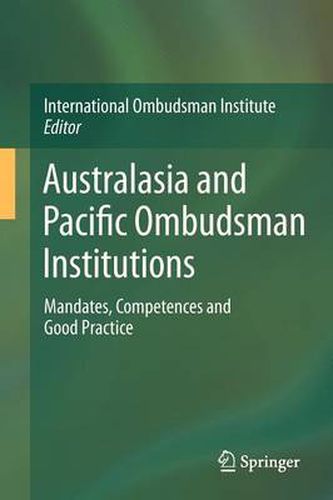Readings Newsletter
Become a Readings Member to make your shopping experience even easier.
Sign in or sign up for free!
You’re not far away from qualifying for FREE standard shipping within Australia
You’ve qualified for FREE standard shipping within Australia
The cart is loading…






This title is printed to order. This book may have been self-published. If so, we cannot guarantee the quality of the content. In the main most books will have gone through the editing process however some may not. We therefore suggest that you be aware of this before ordering this book. If in doubt check either the author or publisher’s details as we are unable to accept any returns unless they are faulty. Please contact us if you have any questions.
Commissioned by the International Ombudsman Institute (IOI), the Ludwig Boltzmann Institute of Human Rights (BIM) in Vienna conducted a comparative analytical study on Ombudsman Institutions in the Australasia and Pacific region between January 2011 and April 2012. In Part 1, this book provides an analytical comparison of the public sector Ombudsman Institutions in Australia (the Commonwealth Ombudsman and the state/territory Ombudsmen of all Australian states as well as of the Northern Territory and the ACT), the Cook Islands, Hong Kong, New Zealand, Papua New Guinea, Samoa, Taiwan, Tonga and Vanuatu. In addition to a comparative analysis showing the partial heterogeneity of the Institutions, a comprehensive overview of common features, and explorations of the specifics and peculiarities of the Institutions, Part 2 presents separate reports on the 16 different jurisdictions featuring their main functions as follows:
- Legal basis, legal status and organisation,
- Mandate, object of control and standard of control,
- Powers, including legal quality and impact of the outcomes of investigative procedures,
- Relationship to the administration, the judiciary and the legislator, and
- Special characteristics.
Part 2 is based on information provided by the Institutions themselves in questionnaires sent out at the outset of the study, an analysis of the respective establishing acts and other relevant laws, and on relevant scientific publications and the Institutions’ Annual Reports. The reports also refer to relevant legal provisions and include websites addresses for ease of reference.
$9.00 standard shipping within Australia
FREE standard shipping within Australia for orders over $100.00
Express & International shipping calculated at checkout
This title is printed to order. This book may have been self-published. If so, we cannot guarantee the quality of the content. In the main most books will have gone through the editing process however some may not. We therefore suggest that you be aware of this before ordering this book. If in doubt check either the author or publisher’s details as we are unable to accept any returns unless they are faulty. Please contact us if you have any questions.
Commissioned by the International Ombudsman Institute (IOI), the Ludwig Boltzmann Institute of Human Rights (BIM) in Vienna conducted a comparative analytical study on Ombudsman Institutions in the Australasia and Pacific region between January 2011 and April 2012. In Part 1, this book provides an analytical comparison of the public sector Ombudsman Institutions in Australia (the Commonwealth Ombudsman and the state/territory Ombudsmen of all Australian states as well as of the Northern Territory and the ACT), the Cook Islands, Hong Kong, New Zealand, Papua New Guinea, Samoa, Taiwan, Tonga and Vanuatu. In addition to a comparative analysis showing the partial heterogeneity of the Institutions, a comprehensive overview of common features, and explorations of the specifics and peculiarities of the Institutions, Part 2 presents separate reports on the 16 different jurisdictions featuring their main functions as follows:
- Legal basis, legal status and organisation,
- Mandate, object of control and standard of control,
- Powers, including legal quality and impact of the outcomes of investigative procedures,
- Relationship to the administration, the judiciary and the legislator, and
- Special characteristics.
Part 2 is based on information provided by the Institutions themselves in questionnaires sent out at the outset of the study, an analysis of the respective establishing acts and other relevant laws, and on relevant scientific publications and the Institutions’ Annual Reports. The reports also refer to relevant legal provisions and include websites addresses for ease of reference.